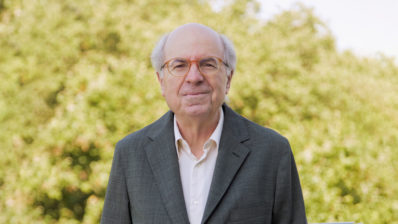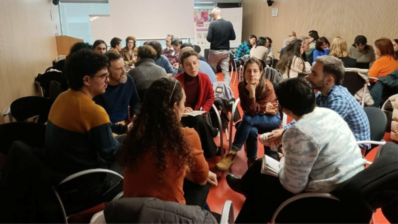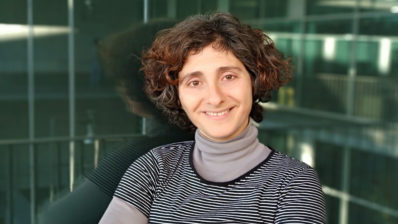On 16th and 17th March, the Governing Board of Euroscience – the European Association for the Advancement of Science and Technology – got together at the Barcelona Biomedical Research Park (PRBB) for their annual meeting. While enjoying the Barcelona sun and the sea views from the building, the 12 recently-chosen board members discussed the organisation of future events as well as the strategy for the association in the coming years.
We talked to Matthias Girod, Secretary General, Michael Matlosz, President, Anna Nilsson Vindefjärd, Vicepresident, and Michela Bertero, member of the governing board, about Euroscience (a membership-based non-profit organization which has just celebrated its 25th anniversary) and the challenges of European science.
What is Euroscience?
It’s more a question of who is Euroscience. It’s an organisation of people who are interested in scientific activity as contributing to the wellbeing and prosperity of society. We have about 1,500 members who actively contribute, but the community is much larger; for example, we have about 6,000 people who come to our main event.
Most of the members are science professionals – researchers, policy makers, research managers, communicators… -, and mostly from the academic sector, although we would like to increase the membership within industry, which also plays a key role in the advancement of science.
But really, it’s open to anyone: it’s about creating strength in a community that believes we need science to conquer diseases, to deal with climate crisis, to create decent democracies… So even if you are not a scientist, if you believe in this, you are more than welcome to become part of Euroscience, because we are working on it. And there is a sense of urgency, because we see many people are going on the other direction…
“If you believe we need science to conquer diseases, to deal with climate crisis, to create decent democracies… you are part of Euroscience. Become a member!”
We also have some corporate members, but the great majority of members are independent of their affiliation – we are interested in the individual, in their professional practice and their personal responsibility and accountability as scientists in a democratic society.
And we cover all disciplines. Actually, we foster interdisciplinarity, connecting experts from natural science and humanities, who are normally too far apart. We have seen this with the Covid-19 pandemic. Virologists on their own cannot beat the pandemic; you need economists, lawyers, sociologists,… And that’s why we want to be an association for everyone who is connected to science.
How has the pandemic affected the interaction of science and society?
The pandemic was a very challenging situation regarding trust, credibility, relevance… and how specialists interact with society. It was an unknown disease, people wanted clear answers (which science can’t always offer) and many scientists had an opinion and expressed it, perhaps beyond their expertise.
To understand this, let’s say that the concept science encompasses different levels:
- the science: a corpus of generally accepted facts and theories
- the scientific method, the research: a methodology to achieve that corpus of knowledge, by checking hypotheses, criticising and invalidating, creating new ones…
- the scientist: someone who is familiar with the corpus of knowledge, and is an expert in the methodology
And what the public was expecting during the pandemic (and perhaps more generally) is a reliable answer from an expert – not research, not the process and the uncertainty and contradictions of it. But if you ask 10 scientists what to do about this new disease, you will probably get 10 different answers. And that – plus of course the rise of fake news – has made people believe the scientific method is unreliable. Which is a shame, and the opposite of the truth. Precisely because we are able to criticise it and invalidate it, it is reliable.
“If you ask 10 scientists what to do about this new disease, you will get 10 answers. And that has made people believe the scientific method is unreliable. Which is a shame”
The pandemic didn’t only change the relationship between scientists and society, but also science itself…
That’s right, and we are very interested in training and empowering scientists to deal with change. Because the pandemic didn’t only change the expectations of society, but the way science is produced. For example, the rate of preprints increased, in order to publish research results as soon as possible (and prior to peer review). And we don’t think this is something that is going to go away. We need these new ways of communicating science, new ways of doing things… We should embrace change and use it as a positive force.
What are the major outputs of Euroscience?
Perhaps the most visible is ESOF (Euroscience Open Forum), a congress that takes place every two years. It’s an opportunity to get together a very diverse group of people, including citizens, to talk about the place of science in society, the practice of scientists and how the interaction with the general society can be improved through bidirectional dialogue. The first one took place in 2004 in Stockholm (in 2008 it was in Barcelona!). We are now organising the 2024 edition, which will be in Katowice, Poland.
But we do a lot of policy work, too. We were involved in the development of the European Charter for Researchers; the creation of the European Research Council (ERC), the Open Science agenda, and the ERA (European Research Area)…
We also have working groups on different topics of interest, and are part of several European projects. And since 2012 we have been awarding the label “European City of Science awards”, and holding events under each EU presidency. For example, under the Check presidency of the Council of the European Union we discussed science diplomacy, in the light of the Ukraine crisis – what happens when good scientific collaborating partners end up on opposite sides of a war? Now, under the Swedish presidency, we will have a session on 16th May, broadcasted digitally, about research assessment. With the Spanish presidency coming up next, on the second half of the year… we’re thinking about it now!
In 2021 we also started the Euroscience Policy Forum, a smaller event with about 600 people, which we plan to hold on alternate years to ESOF. On that one we discussed the topic of sustainable academia: can academic institutions survive as they are under continued pressure for accountability, funding, impact…? Is it really attractive today for a talented young person to follow this career path? These are important questions that we need to take the time to ask and discuss.
Oh, and we also publish the Euroscientist newsletter, a platform for discussion for all the European scientific community.
What are you working on at the moment?
At Euroscience we have a history of tackling difficult questions, things people don’t want to talk about, or things you normally may not have a chance to talk about in your workplace. Here you can discuss your biomedical research topic with an economist, and ask if it makes sense to be focusing on this.
Some current topics we are interested in are 1) the business model for knowledge – how to publish, how fast and in which stages; 2) scientific careers; 3) scientists in the public arena and how they are perceived; 4) research assessment and CoARA; 5) diversity in science; and 6) mental health and wellbeing, amongst others. Really, many topics that can be included in what we call “research culture”, that are transversal to all sciences and affect all scientists.
Where do you see European science in the future; what should be our number one priority?
Let’s express it as a challenge. Will we be able in 10-20 years from now, to reverse the current trend of growing doubt and distrust of scientific expertise and the scientific method? Can we create a climate of confidence amongst the entire population regarding the usefulness of free, open, curiosity-driven knowledge acquisition? This would be something important to achieve. Because this is not what’s happening now. Now we are seeing a huge push for objective-driven research, which of course has fundamental value! But if everything is objective-driven – “you have to solve climate change; you have to improve agriculture;… – what we have is the instrumentalization of science for political or economic gains.
What we need is to create a situation in which being curious, trying to understand, being critical, creating basic knowledge… has value for society. If we can do this, then we will be able to use this scientific knowledge to address societal challenges, to improve wellbeing.







